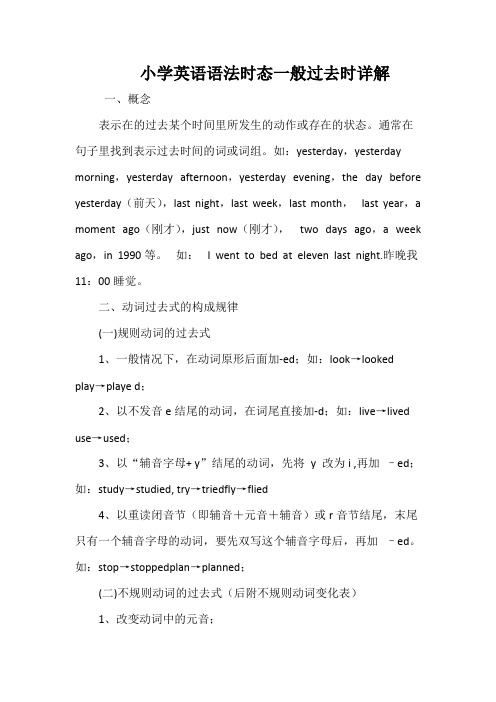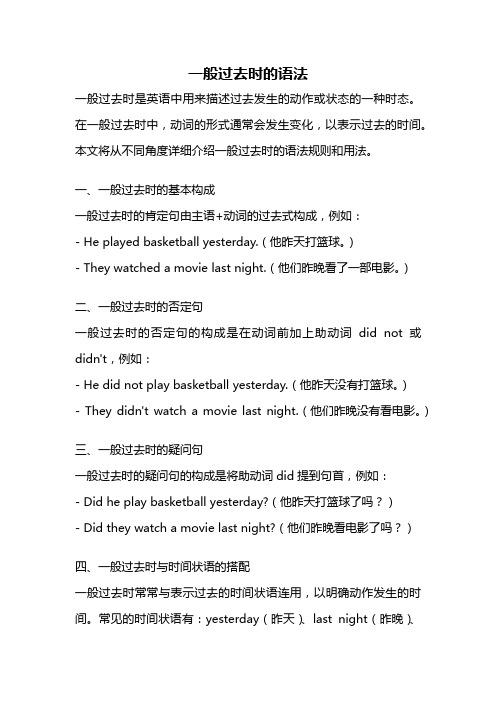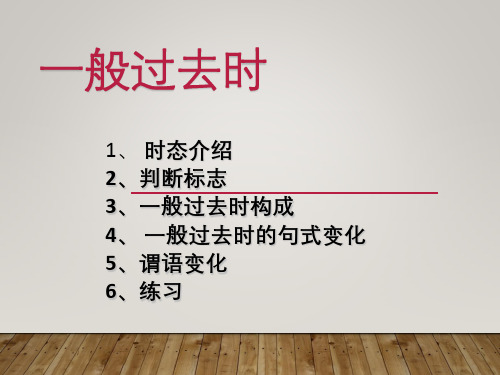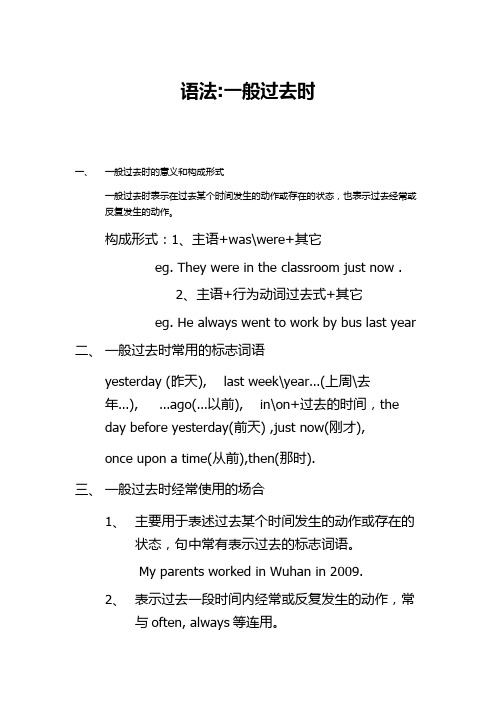英语语法-一般过去时态
(完整)小学英语语法时态一般过去时详解

小学英语语法时态一般过去时详解一、概念表示在的过去某个时间里所发生的动作或存在的状态。
通常在句子里找到表示过去时间的词或词组。
如:yesterday,yesterday morning,yesterday afternoon,yesterday evening,the day before yesterday(前天),last night,last week,last month,last year,a moment ago(刚才),just now(刚才),two days ago,a week ago,in 1990等。
如:I went to bed at eleven last night.昨晚我11:00睡觉。
二、动词过去式的构成规律(一)规则动词的过去式1、一般情况下,在动词原形后面加-ed;如:look→looked play→playe d;2、以不发音e结尾的动词,在词尾直接加-d;如:live→lived use→used;3、以“辅音字母+ y”结尾的动词,先将y 改为i ,再加–ed;如:study→studied, try→triedfly→flied4、以重读闭音节(即辅音+元音+辅音)或r音节结尾,末尾只有一个辅音字母的动词,要先双写这个辅音字母后,再加–ed。
如:stop→stoppedplan→planned;(二)不规则动词的过去式(后附不规则动词变化表)1、改变动词中的元音;begin→began drink→drank come→came eat→ate grow→grew run→ran know→knew win→wonspeak→spoketake→took write→wrote get→got2、变词尾的–d 为–t ;build→built lend→lent send→sent spend→spent bend→bent3、与动词原形一样;cut→cut put→put cost→cost hurt→hurt shut→shut4、变-ay 为-aid (少数动词);say→said pay→paid lay→laid5、采用不同词根;sell→sold teach→taught buy→bought6、其他。
2025届高考英语语法复习一般过去时知识讲解讲义

高考英语一般过去时知识讲解一、结构和用法在英语学习中,时态的掌握是至关重要的一环。
其中,一般过去时作为描述过去发生的动作或存在的状态的时态,具有其独特的结构和用法。
(一)一般过去时的结构1、肯定形式结构:主语 + 动词过去式 + 其他例句:She went to the park yesterday.她昨天去了公园。
规则动词过去式的构成:一般在动词原形末尾直接加上-ed,如:look looked。
以不发音的字母e结尾的动词,去e再加-ed,如:live lived。
末尾只有一个辅音字母的重读闭音节(辅元辅结构),先双写这个辅音字母,再加-ed,如:stop stopped。
末尾是辅音字母+y结尾的动词,先变y为i,然后再加-ed,如:study studied。
2、否定形式结构1:主语 + was/were + not + 其他(be动词的否定)例句:He wasn't at home this morning.他今天早上没在家。
结构2:主语 + didn't + 动词原形 + 其他(行为动词的否定)例句:I didn't know you like coffee.我之前不知道你喜欢喝咖啡。
3、一般疑问句结构1:Did + 主语 + 动词原形 + 其他?例句:Did you go to Beijing last week? 你们上周去北京了吗?结构2:Was/Were + 主语 + 表语?例句:Were you a student 10 years ago?10年前你是学生吗?4、一般过去时的特殊疑问句的构成结构:疑问词 + did + 主语 + 动词原形 + 其他?例句:What did you do last night?昨天晚上你做了什么?常见的特殊疑问词有:who, what, whose, which, when, where, why, how, how long, how much等。
一般过去时的语法

一般过去时的语法一般过去时是英语中用来描述过去发生的动作或状态的一种时态。
在一般过去时中,动词的形式通常会发生变化,以表示过去的时间。
本文将从不同角度详细介绍一般过去时的语法规则和用法。
一、一般过去时的基本构成一般过去时的肯定句由主语+动词的过去式构成,例如:- He played basketball yesterday.(他昨天打篮球。
)- They watched a movie last night.(他们昨晚看了一部电影。
)二、一般过去时的否定句一般过去时的否定句的构成是在动词前加上助动词did not或didn't,例如:- He did not play basketball yesterday.(他昨天没有打篮球。
)- They didn't watch a movie last night.(他们昨晚没有看电影。
)三、一般过去时的疑问句一般过去时的疑问句的构成是将助动词did提到句首,例如:- Did he play basketball yesterday?(他昨天打篮球了吗?)- Did they watch a movie last night?(他们昨晚看电影了吗?)四、一般过去时与时间状语的搭配一般过去时常常与表示过去的时间状语连用,以明确动作发生的时间。
常见的时间状语有:yesterday(昨天)、last night(昨晚)、last week(上周)、in 2010(在2010年)等等。
五、一般过去时的用法1. 表示过去发生的动作或状态She lived in New York for five years.(她在纽约住了五年。
)2. 表示过去经常或反复发生的动作He often went swimming when he was young.(他年轻时经常去游泳。
)3. 表示过去的习惯或常态She always cooked dinner for her family.(她过去总是为家人做晚饭。
初中英语语法专项:一般过去时

• 6S. Mhey misonth’tergliokeins ghertostugdoenstsh.o(变pp一in般g疑to问m句o)rrow.
写出下列动词的过去式:
go
went
use
think thought live
be
was/ were wake
happen happened keep
give gave
say
become became clean
get got
buy
rain rained play
stay stayed learn
pass passed see
answer answered read
used lived woke kept said cleaned bought played learnt/ed saw read
run ran borrow borrowed grow grew watch watched write wrote smile smiled open opened begin began swim swam carry carried study studied
4、一般过去时句式变换
一般过去时态句式的构成
陈述句式
动词
肯定式
否定式
I was ….
I was not(wasn’t)….
He /She/it was…. He/She/It was not(wasn’t)…. be We/You/They were …. We/You/They were not
•元浊 /d/ ,即 ed 在元音,浊 辅音后面念 /d/ ,
英语一般过去时语法知识点

英语一般过去时语法知识点英语一般过去时(Simple Past Tense)是表示过去某个时间发生或存在的动作或状态的一种时态。
以下是英语一般过去时的语法知识点:1. 句子结构:主语+ 动词过去式+ 其他成分。
2. 动词过去式的构成:- 一般情况下,直接在动词原形后面加-ed。
例如:play →played,watch →watched,want →wanted。
- 以不发音的字母“e”结尾的动词,在加-ed前先去掉“e”。
例如:live →lived,change →changed。
- 以辅音字母+y结尾的动词,将y变为i再加-ed。
例如:study →studied,carry →carried。
- 一些不规则动词的过去式需要记忆,例如:go →went,eat →ate,see →saw,do →did。
3. 动词过去式的否定和疑问形式:- 否定形式:主语+ did not + 动词原形+ 其他成分。
缩写为didn't。
例如:I didn't play tennis yesterday.- 疑问形式:Did + 主语+ 动词原形+ 其他成分例如:Did you watch the movie last night?4. 一般过去时的时间状语:昨天(yesterday)、上个月(last month)、去年(last year)等表示过去某个具体时间的时间状语。
5. 一般过去时的用法:- 表示过去某个具体时间发生的动作或状态。
例如:I went to the beach yesterday.- 表示过去一段时间内发生的动作或状态。
例如:I lived in London for two years.- 表示过去习惯性的动作或状态。
例如:When I was a child, I always played with my friends.以上就是英语一般过去时的语法知识点。
记得多加练习,熟练掌握一般过去时的用法。
语法 一般过去时

语法:一般过去时一、一般过去时的意义和构成形式一般过去时表示在过去某个时间发生的动作或存在的状态,也表示过去经常或反复发生的动作。
构成形式:1、主语+was\were+其它eg. They were in the classroom just now .2、主语+行为动词过去式+其它eg. He always went to work by bus last year 二、一般过去时常用的标志词语yesterday (昨天), last week\year…(上周\去年…), …ago(…以前), in\on+过去的时间,theday before yesterday(前天) ,just now(刚才),once upon a time(从前),then(那时).三、一般过去时经常使用的场合1、主要用于表述过去某个时间发生的动作或存在的状态,句中常有表示过去的标志词语。
My parents worked in Wuhan in 2009.2、表示过去一段时间内经常或反复发生的动作,常与often, always等连用。
John always had lunch at school last term.3、表示已故的人所做的事情。
Lao She wrote many great works in his life .4、有些句子,虽然没有表示过去确定时间的状语,但通过语境或语感可知某一动作已经发生,要用过去时。
Why didn’t you come to the party?5、表示过去所发生的一连串的动作。
My sister came into the room, turned on thelight and watched TV .四、规则动词过去式变化规则1.一般在动词末尾加-ed,如:play-played, cook-co2.结尾是e加d,如:like-liked love-love3.末尾只有一个元音字母和一个辅音字母的重读闭音节,应双写末尾的辅音字母,再加-ed,如:stop-stoppe4.以“辅音字母+y”结尾的,变y为i,再加-ed,如:study-studied五、四种句式的构成1、一般过去时态的肯定句式“主语+动词过去式+其它”例如:Jenny bought a skirt yesterday. 詹妮昨天买了一件短裙。
英语语法——一般过去时课件(共44张PPT)
肯否回答:
一般疑问句: Be动词(was/were)+主语+其他+?
肯定回答:Yes , 主语+ was/were. 否定回答:No , 主语+ wasn’t/weren’t . --- Was he at home yesterday ? ---他昨天在家吗? --- Yes , he was .是的,他在 --- No , he wasn’t . 不,他不在。
study — studied
carry— carried
5.不规则变化. (见不规则动词表P97)
be动词 的一般过去时
Please look at the sentences
我今年12岁. I _a_m_ 12 years old this year.
我去年11岁. I _w_a_s_ 11 years old last year.
实意动词的一般 过去时句子结构
每天,早餐我吃鸡蛋和牛奶。 I _h_av_e_ eggs and milk for breakfast every morning.
昨天,早餐我吃面条。
I _h_a_d_ noodles for breakfast yesterday morning.
他每天都吃水果。 He _h_a_s__ fruit every day.
1. I _______ at school now.
was 2. He ________ at the camp last week. were 3. We ________ students two years ago. were 4. They ________ on the farm a moment ago. was 5. Yang Ling ________ eleven years old last year. was 6. There ________ an apple on the plate yesterday. was 7. There ________ some milk in the fridge yesterday. was 8. The mobile phone _______ on the sofa yesterday evening.
小学英语语法时态一般过去时详解
小学英语语法时态一般过去时详解小学英语语法时态:一般过去时详解一般过去时的用法一般过去时(Simple Past Tense)用来表示发生在过去的动作、情况或状态。
一般过去时的标志词通常是过去式的动词,但也可能有一些特殊的动词。
一般过去时的构成一般过去时的肯定句式由主语 + 动词的过去式构成,否定句式由主语 + 动词的过去式后加not构成。
疑问句则将助动词did置于句子的开头,然后是主语和动词原形。
下面是一些例句:- 肯定句例子:I played soccer yesterday.(我昨天踢足球了。
)- 否定句例子:He did not go to the party.(他没有去参加派对。
)- 疑问句例子:Did you watch the movie last night?(你昨晚看电影了吗?)一般过去时的常见时间状语词一般过去时通常会和一些时间状语词一起使用,以明确动作发生的具体时间。
以下是一些常见的时间状语词:- yesterday(昨天)- last week(上周)- two days ago(两天前)- in 1998(在1998年)一般过去时的特殊用法一般过去时有一些特殊的用法需要注意:1. 表示过去经常性的动作或惯。
例如:When I was young, I played soccer every day.(当我年轻时,我每天都踢足球。
)2. 表示过去事实或真理。
例如:The earth revolved around the sun.(地球绕太阳转。
)总结一般过去时用来描述发生在过去的动作、情况或状态。
它的构成简单,使用过去式的动词作为标志词。
通过加入时间状语词,可以更明确地指出动作发生的具体时间。
同时,一般过去时还有一些特殊的用法,需要灵活运用。
>注意:本文内容仅供参考,具体使用时请根据实际情况和教材要求进行调整。
高中英语语法一般过去时详细讲解
在高中英语学习中,了解和掌握一般过去时是非常重要的。
一般过去时用于描述过去发生的动作、状态或习惯。
本文将详细介绍一般过去时,以帮助学生更好地理解和运用这一时态。
一、一般过去时的用法:一般过去时用于以下情况:1. 过去发生的动作:表示在过去某个时间发生的动作或事件。
例句:I watched a movie last night.(昨晚我看了一部电影。
)2. 过去的状态:描述过去某一时刻的状态或条件。
例句:She was happy yesterday.(昨天她很开心。
)3. 过去的习惯:表示过去经常或习惯性发生的动作。
例句:They always went for a walk after dinner.(他们过去经常在晚饭后散步。
)二、一般过去时的构成:一般过去时的肯定句由主语加动词的过去式构成,否定句和疑问句需要使用助动词did。
1. 肯定句的构成:主语+ 动词过去式+ 其他成分例句:He played soccer with his friends yesterday.(昨天他和他的朋友们踢足球。
)2. 否定句的构成:主语+ did not + 动词原形+ 其他成分例句:She did not go to the party last night.(她昨晚没有去参加派对。
)3. 疑问句的构成:Did + 主语+ 动词原形+ 其他成分?例句:Did you finish your homework?(你完成作业了吗?)三、一般过去时的常见例句:1. I visited my grandparents last summer vacation.(去年暑假我拜访了我的爷爷奶奶。
)2. He studied English for three hours yesterday.(昨天他学了三个小时的英语。
)3. We didn't see each other for a long time.(我们很长时间没有见面了。
小学英语语法--一般过去时
小学英语语法:一般过去时一般过去时表示过去某时所发生的动作或情况;或表示过去习惯性的动作。
一般过去时动词的规则变化:过去式一般在动词的词尾加ed构成。
一般过去时的用法:1)表示过去某一时间被发生的动作或存在的状态。
常与表示过去的时间状语连用(yesterday, last week, an hour ago等)。
例:Did you have breakfast this morning?你今天早上吃过早餐了吗?She left here just now.她刚刚离开这里。
My father go t home at ten o’clock last night.我父亲昨晚十点到家。
2)表示过去一段时间内经常或反复的动作。
常与always(总是),never(从不)连用。
例:My grandma always carried an umbrella.我奶奶过去总是带着一把伞。
I never drank wine.我从不喝酒。
句子形式:1.肯定句基本句型:主语+动词的过去式+……例:I played the piano yesterday evening.我昨晚弹钢琴了。
She found a new English book.她找到了一本新英语书。
主语+be动词的过去式(was/ were)+……例:I was very tired last night.我昨天晚上很累。
He was an English teacher.他以前是个英语老师。
There were some books there.那儿曾经有一些书。
2.否定句:无论主语是第几人称,是单数还是复数,只要在动词前加did not(didn’t)即可。
基本句型:主语+did not(didn’t)+动词原形+……(did not(didn’t)后的动词一律是动词原形)例:I didn’t have English classes this morning.今天上午我没有英语课。
- 1、下载文档前请自行甄别文档内容的完整性,平台不提供额外的编辑、内容补充、找答案等附加服务。
- 2、"仅部分预览"的文档,不可在线预览部分如存在完整性等问题,可反馈申请退款(可完整预览的文档不适用该条件!)。
- 3、如文档侵犯您的权益,请联系客服反馈,我们会尽快为您处理(人工客服工作时间:9:00-18:30)。
英语语法————一般过去时态一.定义:一般过去时表示过去某个时间发生的动作或存在的状态。
常和表示过去的时间状语连用。
如:last year, yesterday等;也可表示过去经常反复发生的动作,常和often, always等频率副词连用二用法:(1)表示过去某一时刻或某一段时间内所发生的动作或情况,通常一般过去式带有表示动作时间状语的词,词组或从句,如 yesterday, the day before last, last week, two days ago 等,上下文清楚时可以不带时间状语。
I worked in that factory last year. 去年我在那一家工厂工作。
I went to the Tian Long Mountain yesterday. 昨天我们去了天龙山。
(2)一般过去时态:表示过去某一时间所发生的动作或存在的状态。
谓语动词要用一般过去式。
时间标志:yesterday(昨天), last week(上周), last month(上个月), last year(去年), two months ago (两个月前), the day before yesterday(前天),in 1990 (在1990年), in those days (在那些日子里), just now (刚才) , that day , this morning 等表示过去的时间状语。
如: I was born in 1990. (我出生在1990年)。
When did you go to the park? (你是什么时候去的公园)。
I went to the park last week. (我是上周去的公园)在上面的句子中第一句属于be动词的一般过去时态;第二句和第三句属于实义动词的一般过去时态。
三.句型结构1. Be 动词的一般过去时态在没有实义动词的句子中使用be动词, am is 的过去式为was; are的过去式为were.构成:肯定句:主语+was (were) +宾语 ,如:I was late yesterday. (昨天我迟到了。
)否定句:主语+was (were) +not+宾语如:We weren't late yesterday. (我们昨天没迟到)疑问句:Was (Were) +主语+宾语如: Were you ill yesterday? (你昨天病了吗?)肯定回答: Yes, I was. (是的,我病了。
)否定句: No, I wasn't. (不,我没病。
)特殊疑问句:特殊疑问词+was (were) +主语+宾语如:When were you born? 你是什么时候出生的?2.实意动词肯定句:主语+ 动词过去式 + 宾语… She swam in the river yesterday afternoon .否定句:主语+didn’t + 动词原形 +宾语… She didn’t swim in the river yesterday afternoon .疑问句:Did +主语 +动词原形 + 宾语… ? Did she swim in the river yesterday afternoon .肯定回答: Yes , 主语 +did . Yes, she did .否定句: No , 主语 +didn’t . No , she didn’t .特殊疑问句:特殊疑问词+ did + 主语 +动词原形 + 宾语…? -When did she swim in the river ?-She swam in the river yesterday afternoon .规则动词的变化规则:①一般在动词原形末尾直接加上-ed。
如:look-looked。
②以不发音的字母e结尾的动词,去e再加-ed。
如:live-lived。
③以单辅音字母结尾,而这个辅音前为单元音字母a、e、i、o、u的单音节动词之后,先双写这个辅音字母,再加- ed。
如:stop-stopped。
④末尾是辅音字母+y结尾的动词,先变y为i,然后再加-ed。
如:study-studied。
不规则动词的过去式大体上归纳有以下六条记忆法:1. 以t结尾的词,过去式与原形相同。
如:put—put, let—let, cut—cut, beat—beat2. 以d结尾的词,把d变成t。
如:build—built, lend—lent, send—sent, spend—spent3. 以n结尾的词,在词后加t。
如:mean—meant, burn—burnt, learn—learnt4. 以ow / aw结尾的词,把ow / aw变成ew。
如:blow—blew, draw—drew, know—knew, grow—grew5. 含有双写字母的词,将双写改为单写,在词尾加t。
如:keep—kept, sleep—slept, feel—felt,smell—smelt6. 含有元音字母o / i的词,将o / i变成a。
如:sing—sang, give—gave, sit—sat, drink—drankswim –swam , begin – began , ring – rang ,B不规则动词(1)AAA型一.写出下列单词的过去式:1.do / does _______ 2 have / has _________ 3.am / is ________ 4.are ________ 5.go _______________ 6.pay _______________ 7.can ___________ 8.take ________ 9.play ____________ 10.study ____________ 11.watch ________ 1e ________ 13.read ____________ 14.put ____________ 15.eat ___________ 16.begin _______ 17.swim ____________ 18.run _____________ 19.sing___________ 20.buy _________ 21.teach ___________ 22.look ____________ 23.hope _________ 24.see _________ 25.live ___________ 26.get _____________ 27.stop _________ 28.find________ 29.write __________ 30.tell ___________ 30.think ________二、请用正确动词形式填空。
1. I _______ (have) an exciting party last weekend.2.- _______ she ______ (practice) her guitar yesterday? -No, she _________.3. -What ________ Tom ________ (do) on Saturday evenings?-He ________(watch) TV and _______(read) interesting books .4. They all _________(go) to the mountains yesterday morning.5. She ______(not visit) her aunt last weekend. She ______(stay) at home and ____ (do) some cleaning.6.- When ________ you _________(write) this song?-I __________(write) it last year.7. My friend, Carol, ________(study) for the math test and ________(practice) English last night.8. -________ Mr. Li ________(do) the project on Monday morning? -Yes, he _________.9.- How _________(be) Jim's weekend? -It _________(be not) bad.10. -________ (be) your mother a shop assistant last year? -No. she __________.11. Tom and Mary ___________ (come) to China last month.12. M ike _________________(not go) to bed until 12 o’clock last night. So he ______ (get ) up late.13. Mary __________English yesterday morning. She often ________ in the morning . Listen , she _________ in the next room . (read)14. There _________ (be) no one here a moment ago.15. I ___________ (call) Mike this morning.16. I listened but ___________ (hear) nothing.17. Tom ___________ (begin) to learn Chinese last year.18. Last week we _________ (plant) many apple trees on the farm.19. My mother ________________ (not do) housework yesterday.20. She _______(watch) TV every evening. But she ____________ (not watch) TV last night. 21.________ your father ________ ( go ) to work every day last year?22.-What time _______ you _______ (get) to Beijing yesterday?-We __________ (get) to Beijing at 9:00 in the evening.23. What __________ (make) him cry (哭) just now?24. Last year the teacher ___________ (tell) us that the earth moves around the sun.25. There ____________ a telephone call for you just now. (be)26. There __________ not enough people to pick apples that day. ( be)27. There ______( be not) any hospitals in my hometown (家乡) in 1940.28. There ____________ enough milk at home last week, wasn’t there?29. Eli ____________ to Japan last week. ( move)30. –When _______ you _________ (come) to china? Last year.31. Did she ________ (have) supper at home?32. Jack ____________ (not clean) the room just now.33. _________ (be) it cold in your city yesterday?34. How many people ________ (be) there in your class last term?35. It ______(be) hot yesterday and most children _______ (be) outside.36. There ________ (be) a football match on TV yesterday evening, but I _________ (have) no time to watch it.三、句型转换1.Tom read an English book last week.否定句:__________________________________________一般疑问句:________________________________________肯定回答:______________ 否定回答:__________________对划线部分提问:____________________________________用every day 改写____________________________________2. There were about nine hundred people at the concert.(音乐会)3.There was only one problem .4. Ann did her homework yesterday evening.否定句:__________________________________________一般疑问句:________________________________________肯定回答:______________ 否定回答:__________________对划线部分提问:____________________________________用at the monent 改写:____________________________________5. The children had a good time in the park.7. She had some bread for lunch today.8. They read English last night.四.改错题1.How is Jane yesterday? 2.He go to school by bus last week.3.He often goes home at 6:00 last month. 4.I can fly kites seven years ago.5.Did you saw him just now. 6.Tom wasn’t watch TV last night.7.I didn’t my homework yesterd ay. 8.He wait for you three hours ago.9.Who find it just now ? ________________________________________五. 翻译下列句子1. 我过了一个忙碌但却刺激的周末。
